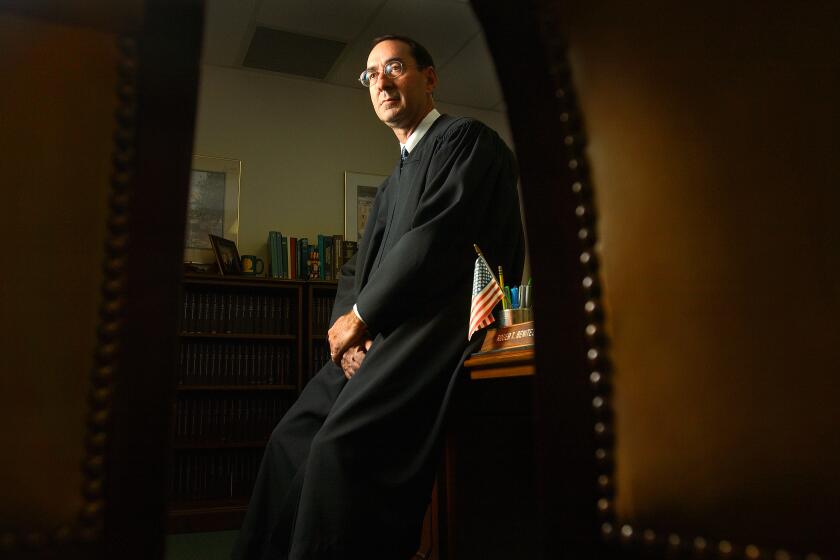Activists Renew Call for AIDS Bias Ban : Government: County supervisors are asked to approve anti-discrimination measure. Board rejected it in ’89 and isn’t likely to change now.
Re-entering a political minefield, a coalition of community activists on Tuesday asked the Board of Supervisors to approve a measure barring discrimination against AIDS sufferers in employment, education and housing.
But the proposal faces a doubtful future. None of the county supervisors who have opposed the idea in the past indicated any change of heart Tuesday.
In June, 1989, a bitterly divided board rejected a similar measure after impassioned appeals from opponents led by Rep. William E. Dannemeyer (R-Fullerton) and the Rev. Louis P. Sheldon.
Opponents at the time attacked the measure for protecting the homosexual “lifestyle,” while others said it needlessly duplicated existing protections under federal and state law.
This time around, supporters of the anti-discrimination ordinance say they hope that basketball star Earvin (Magic) Johnson’s announcement that he has the HIV infection will sway public debate in their favor.
“The face of AIDS has changed,” said activist Pearl Jemison Smith of the Orange County Community HIV Coalition, which drafted the proposal and sent a representative to the supervisors’ meeting Tuesday to present it.
At a press conference, nearly a dozen coalition members took pains to present themselves as a broad-based group, made up of religious leaders, doctors, government officials, AIDS sufferers, gay activists and others.
While many in the general public may have previously viewed AIDS as a “gay issue,” coalition members said, Magic Johnson and recent events have made people realize that the deadly disease strikes a wider swath of society.
Coalition officials estimated that there are now 2,000 people in Orange County with AIDS and several thousand more infected with the human immunodeficiency virus. Discrimination is commonplace against many in seeking and keeping jobs, finding homes and getting insurance, they said.
The new proposal is somewhat broader than the one rejected in 1989. Coalition organizers said they intended the proposal to cover all of Orange County, but county officials said they believe it would only affect the 126,000 residents and the businesses in unincorporated areas.
The proposal would bar discrimination in business, employment, education and housing against those infected with HIV and AIDS sufferers or those perceived to be infected.
It would authorize the county to investigate claims of discrimination and would provide for back wages, attorney’s fees, and damages in such cases.
“We can’t legislate prejudice--that’s impossible,” said Dr. Max Schneider, a professor at UCI Medical Center in Orange and a member of the HIV Coalition. “We can legislate behavior.”
In Orange County today, he said, “HIV people are being treated as if they were lepers.”
Laguna Beach Mayor Robert F. Gentry, whose city is the only in Orange County with an AIDS anti-discrimination ordinance, said coalition leaders are looking to the county government to “set a community standard.”
HIV Coalition members said they hope to get the Board of Supervisors to vote on the proposal within six months. “We need to continue lining up our ducks before a vote,” said Joel Loquvam, an attorney and coalition member.
But the votes may not fall into place as coalition members hope.
“It’s not going to fly,” predicted Supervisor Thomas F. Riley, who along with Supervisor Harriett M. Wieder voted for the 1989 measure. “I don’t see a change in attitude.”
Indeed, none of the three supervisors who opposed the measure--Chairman Roger R. Stanton and Supervisors Gaddi H. Vasquez and Don R. Roth--indicated any initial support Tuesday.
Vasquez said: “There are already laws on the (federal) books, and nothing’s changed as far as I’m concerned.”
Roth said: “Right now, I’m keeping my options open . . . but you don’t have a lot of enthusiasm from me on the issue. I think there’s enough adequate legislation on the books.”
Stanton said he would have to review the proposal before commenting.
Wieder, saying the need for such an ordinance is “more urgent than ever,” said she is hopeful that one of her colleagues may change his mind and support the ordinance. But she faces stiff opposition from local conservatives.
“We will be just as active in opposing this as we were in ‘89,” said Sheldon of the Anaheim-based Traditional Values Coalition, which mailed more than 1,000 letters to its members in 1989 urging them to attend the board’s vote on the issue.
“This is a homosexual issue very clearly,” Sheldon said. “While we need to be very compassionate to those who have the disease, we still have to look at the homosexual lifestyle behind it. The issue behind the HIV virus is promiscuity . . . and this (proposal) isn’t going anywhere.”
More to Read
Start your day right
Sign up for Essential California for news, features and recommendations from the L.A. Times and beyond in your inbox six days a week.
You may occasionally receive promotional content from the Los Angeles Times.






